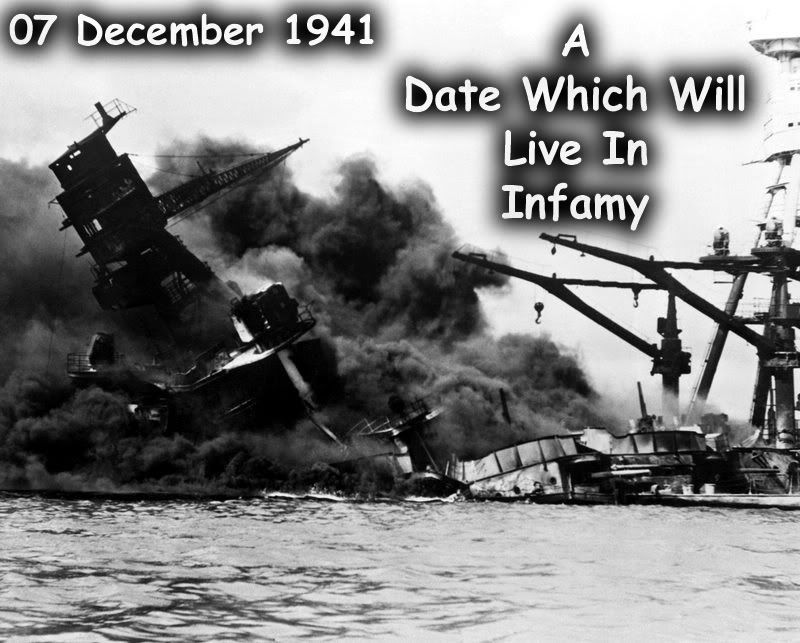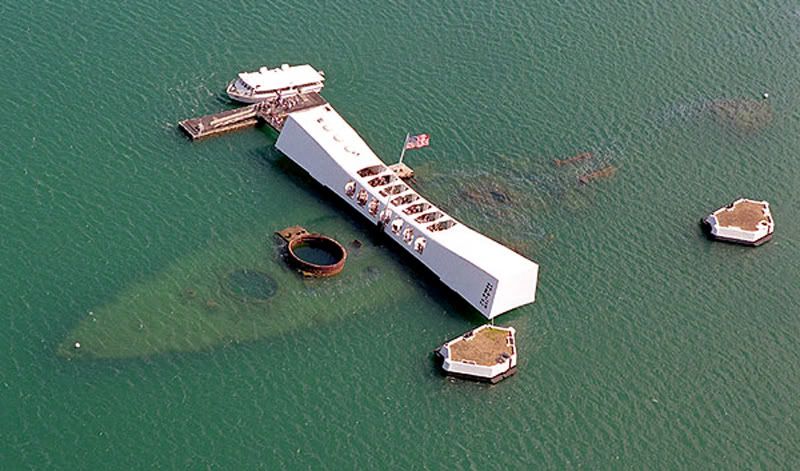Results 1 to 20 of 34
-
12-07-2008, 05:00 AM #1
"A date that will live in infamy"
I asked a few people at work the following question:
'It has been said that Sunday, December 7th would be 'A date that will live in infamy' Do you know why?"
4/9 people knew why.
Of those four people, three knew who gave the quote.
Sad, really.Wilderness is not a luxury but a necessity of the human spirit, as vital to our lives and water and good bread
- Edward Abbey
-
12-07-2008 05:00 AM # ADS
-
12-07-2008, 06:29 AM #2
Sad how most Americans don't know (or care about) our history. We're doomed to repeat mistakes over and over again..
December 7th, 1941 - a date that will live in infamy. (FDR)
-
12-07-2008, 06:55 AM #3
Real sad. Just goes to show; we're too busy to remember tragedy and it sets us up perfectly for history repeating itself.
-
12-07-2008, 06:59 AM #4
It is true that most Americans don't know their history, geography or much of anything else that goes on either in the US past or in other countries.
-
12-07-2008, 07:36 AM #5
Here's some pics...


-
12-07-2008, 09:26 AM #6
Survivor just tried to forget
At 88, he finally talks about attack
Jim Wise, Staff Writer
Comment on this story
John N. Pollok was out on deck that morning. It was right after breakfast, and he wanted a breath of air before going on watch down in the hot engine room.
Then he saw the planes coming in. When a machine-gun round hit the deck right in front of him, he knew Pearl Harbor was under attack.
"I got up and ran," he recalled, sitting last week in his Durham apartment surrounded by Christmas decorations and service memorabilia. "I was lucky I didn't get killed right then."
Pollok was a 21-year-old seaman aboard the USS Whitney, a repair vessel. He had joined the Navy in 1938, fresh out of Durham High School with thoughts of seeing the world and ambitions of earning a commission up through the ranks.
On that Sunday morning, 67 years ago today, he found himself firing a .50-caliber machine gun at Japanese Zeros while bombs and torpedoes went off all around him, ships exploded and sank and more than 2,400 Americans died.
"I did see the old Utah," he said. "Saw that hit with a torpedo and turn upside down, and about that time the Arizona blew up. They hit that with two torpedoes and I don't know how many bombs. ... I saw the West Virginia turn over. ... Saw the Shaw hit with a bomb, and it blew all to pieces."
There was no time to be nervous or scared or to think, he said. That came later -- the next day, and through the next week as Navy crews drilled into the hulls of capsized ships to rescue trapped survivors. Those who were saved, Pollok said, "were crazy."
"I tried to forget it," he said. "I tried my best to forget it."
John Pollok is retired now. He lives alone in a comfortable apartment, a widower since 2006 after 63 years of marriage to the former Kathran Richmond. He has outlived all five of his siblings, one of his children and a grandson. He had an operation for skin cancer not long ago -- a souvenir of Navy years spent outdoors under a South Pacific sun -- and his legs aren't as strong as they once were. But he nevertheless appears a hale and hearty 88-year-old.
"He is sharp as a tack," said a neighbor, David Searcy. "Very colorful."
At Christmastime, Pollok and his daughter, Kathy Bordeaux of Timberlake, cook holiday goodies and take platefuls around the apartment complex. In the summer, he grows tomatoes outside his front door and shares them around as well.
"A very kind and generous man," Searcy said.
One thing he has not been generous about, for the past 67 years, is what happened in the war.
"People would approach me," he said, "and want me to tell them what happened here, what happened there. I'd tell them, 'Look, I don't know, because I have forgotten. I tried my best. I didn't even tell my wife about this thing. She didn't know a thing about it. ...
"I just didn't tell it."
Dodging bullets
Last week, he relented, and agreed to an interview and photographs.
On the Whitney, Pollok's job in case of attack was to be in the repair party -- ready to go in case the ship was hit. The Whitney was moored near seven destroyers, but, aside from strafing, the Japanese left the ship alone.
"We put up such hot anti-aircraft fire that the planes veered away from us."
Pollok was part of that. He saw a machine gun standing idle at his station and started firing -- he had qualified on the .50-caliber just the month before.
"I can't tell you I shot down a plane, but I could see my tracers going right through the planes," he said.
It was a good thing the Whitney's gunners kept up the fire. Besides housing repair crews, their ship was carrying ammunition.
"We had 600-pound depth charges in our magazine, plus 200 torpedoes," Pollok said. "We were a bomb itself. If we had been hit with a torpedo, I wouldn't be sitting here."
Rising in the ranks
Pollok was born on Mangum Street in Durham on April 30, 1920. He remembers sitting on the curb outside the house and watching streetcars travel along the cobblestone street. His father was a railroad man -- "a good provider, I'll tell you that" -- who lost a leg and nearly his life in a railway accident but retired on a comfortable pension thanks to the Railroad Brotherhood.
But the family was large and Depression times were hard. There wasn't money for Pollok to go to college, so he chose the service. He took classes and rose to higher and higher responsibility. Eventually, he was the only crewman on board besides the skipper who could translate Navy code and was standing watches on the bridge. At that point, he got that commission.
But that was some time after Pearl Harbor.
After the attack, the Whitney sailed through the South Pacific, dodging an enemy submarine back and forth across the International Date Line and feeling its way through a minefield at Tonga. At New Caledonia, Pollok and his crewmates found the Japanese fighting island natives. At Eniwetok in the Marshall Islands, kamikazes hit, but the Whitney survived.
"The Whitney seemed to be a lucky one," Pollok said.
Pollok's own luck ran out -- in a way. At Eniwetok he came down with a "tropical fungus infection" -- later found to be skin cancer -- and was shipped home. The voyage took 30 days, aboard a hospital ship stopping island by island to pick up wounded. They docked at San Diego, where Pollok was in treatment for three months. He did get enough time off to come home and marry his high-school sweetheart.
'I did my job'
Back on active duty, Pollok served aboard two destroyers -- the Sullivan and the Miller -- before being transferred to the Norfolk Navy Yard. He was there when the war ended and his enlistment came up. His commodore wanted him to stay in the service, and promised to bump him up several ranks in no time. His wife said no.
"If you don't come out, I'll divorce you," she told him.
Heeding a voice of real authority, Pollok left the Navy and has no regrets -- but he did stay in the reserves for seven more years, eventually making lieutenant junior grade.
"It was a good life," he said. "I can't quibble about the Navy one iota."
In civilian life, he worked awhile at the Durham Sears, then became a sales representative covering three states for the U.S. Borax and Chemical Corp. Retiring, he got bored and became an apartment-complex manager until his doctor told him he ought to quit.
A wall in Pollok's "junk room" is hung with service certificates and citations. He has a Pearl Harbor survivor cap, bearing ribbons and medals. "Every time I wear it, I'm a celebrity," he said.
Still, he said, "I'm trying to forget. I've told you more than I've told anybody, so far."
Around Dec. 7, though, he can't help but remember some things; and he looks forward to remembrances and ceremonies, in his way.
"I feel this way about World War II," he said. "People in my church will come to me and say, 'I appreciate what you did.' ... I feel like they owe me nothing. I was there, and I was available, and I did my job. That's the only thing I can say."
jim.wise@newsobserver.com or 919-932-2004
-
12-07-2008, 11:55 AM #7
The bell from the USS Utah is in front of the Naval Science Building at the University of Utah. I pass it every day. Pretty cool piece of history right here in our backyard. Maybe I
-
12-07-2008, 12:57 PM #8
Even more discouraged now.
5/17 people.Wilderness is not a luxury but a necessity of the human spirit, as vital to our lives and water and good bread
- Edward Abbey
-
12-07-2008, 01:04 PM #9
Great story Erial, thanks for sharing

-
12-07-2008, 01:53 PM #10
One of my father's brothers was at sea on 12/7/1941. He was a Coast Guardsman and was a member of an escort crew convoying a large British force from Halifax to Singapore. . Just weeks later those British troops were surrendered to the Japanese force in February 1942 and many would subsequently die in the prisoner of war camps. My uncle made it through the war and will celebrated his 93rd birthday this coming February.
-
12-07-2008, 02:03 PM #11Your problem is that you
 Originally Posted by Mtnman1830
Originally Posted by Mtnman1830
-
12-07-2008, 02:10 PM #12
[quote=James_B_Wads2000]
Your problem is that you Originally Posted by Mtnman1830
Wilderness is not a luxury but a necessity of the human spirit, as vital to our lives and water and good bread
Originally Posted by Mtnman1830
Wilderness is not a luxury but a necessity of the human spirit, as vital to our lives and water and good bread
- Edward Abbey
-
12-07-2008, 02:31 PM #13
I would fail this quiz. I'm a fan of not repeating bad history though. So I read the wiki on it and got a couple things to pass on. If you knowledgeable guys have others, I would be interested.
1. Keep an eye on the Japanese, they are sneaky.
2. If you push countries like Japan around, namely the Export Control Act of 1940, the McCollum memo, and play big bother, sooner or later they are gonna kick your a$$. Or at least try too.
Wiki entry is interesting, does sound a bit familiar hmmm? We piss someone off, they catch us with our pants down, get a really good shot in, that pisses us off, and we go kick their asses. Hmmm.
http://en.wikipedia.org/wiki/Attack_on_Pearl_Harbor
Main article: Events leading to the attack on Pearl Harbor
War between Japan and the United States had been a possibility each nation had been aware of (and developed contingency plans for) since the 1920s, though tensions did not begin to grow seriously until Japan's 1931 invasion of Manchuria. Over the next decade, Japan continued to expand into China, leading to all out war in 1937. In 1940, Japan invaded French Indochina in both an effort to control supplies reaching China, and as a first step to improve her access to resources in Southeast Asia. This move prompted an American embargo on oil exports to Japan, which in turn caused the Japanese to initiate its planned takeover of oil production in the Dutch East Indies.[15] Furthermore, the transfer of the U.S. Pacific Fleet from its previous base in San Diego to its new base in Pearl Harbor was seen by the Japanese military as the U.S. readying itself for a potential conflict between the two countries.
Pearl Harbor on October 30, 1941.
Preliminary planning for an attack on Pearl Harbor to protect the move into the "Southern Resource Area" (the Japanese term for the East Indies and Southeast Asia generally) had begun in very early 1941, under the auspices of Admiral Yamamoto, then commanding Japan's Combined Fleet.[16] He won assent to formal planning and training for an attack from the Imperial Japanese Navy General Staff only after much contention with Naval Headquarters, including a threat to resign his command.[17] Full-scale planning was underway by early spring 1941, primarily by Captain Minoru Genda. Over the next several months, pilots trained, equipment was adapted, and intelligence collected. Despite these preparations, actual approval of the attack plan was not issued by Emperor Shōwa until November 5, after the third of four Imperial Conferences to consider the matter.[18] Final authorization was not given by the emperor until December 1, after a majority of Japanese leaders advised him the "Hull Note" would "destroy the fruits of the China incident, endanger Manchukuo and undermine Japanese control of Korea."[19] By late 1941 U.S. Pacific bases and facilities had been placed on alert on multiple occasions, with hostilities between the U.S. and Japan expected by many observers. U.S. officials doubted Pearl Harbor would be the first target in any war with Japan, instead expecting the Philippines to be attacked first due to the threat it posed to sea lanes to the south[20] and the erroneous belief that Japan was not capable of mounting more than one major naval operation at a time.[21]
There has been ongoing controversy due to allegations made by conspiracy theorists that some members of the Roosevelt administration had advance knowledge of the attack, and that this was purposefully ignored in order to gain public and Congressional support for the U.S. entering WWII on the side of the British Empire.[22]Your safety is not my responsibility.
-
12-07-2008, 10:39 PM #14
[quote=James_B_Wads2000]Your problem is that you
-
12-09-2008, 06:44 AM #15
Most people never remember the beginning of wars, most people celebrate the victories. The same applies to the land where I came from. USSR was attacked on Aug 18th, 1941, but we celebrate May 9th, the Russian WW2 victory.
-
12-09-2008, 07:16 AM #16
-
12-09-2008, 07:52 AM #17
Even I knew that date Don. That just proves that I am a better Americian than you!

James
-
12-09-2008, 10:05 AM #18
[quote=JP][quote=James_B_Wads2000]Your problem is that you
-
12-09-2008, 10:27 AM #19
We get into the arguments of "which is more important".
The main point is, December 7th is an important date because we reflect on what happened. In a decade or two, young people will try to memorize the year 2001 for their school test in accordance with Sept 11th. But they'll know Sept 11th, they might fudge on the year though.
The year is good to know, but it's also good to remember the date every year when it comes around.
-
12-09-2008, 11:00 AM #20
Dec. 7th - the day we should all ask ourselves why Japan attacked the United States.
Answer: They finally responded the economic warfare we'd been engaging in with them for years. The U.S. had essentially enforced embargoes on Japanese trade with dozens of other countries. Japan is a very small country, with few natural resources. They have to import much of their raw materials. The U.S., while superficially stating they were not going to engage in physical warfare, were concurrently behind the scenes battling a tremendous war in economic terms. By limiting what they could import, the Japanese were essentially paralyzed. The attack at Pearl Harbor was a result.
Make no mistake, America wanted in on WWII, but they needed a noble reason. It was only a matter of time before Pearl Harbor happened, and it was a consequence that FDR's administration not only expected, but some may even suggest FDR desired.
Was it an immoral act? Absolutely. Tragic? No doubt.
Shocking, sudden, and unprovoked? Not at all.
That's the history we should all know about. Dates are unimportant. Context is.
Similar Threads
-
"ColorPlak" or "ColorBox"?
By apcronnelly in forum General DiscussionReplies: 4Last Post: 01-28-2010, 11:26 PM -
"Gorgeneering" (or be glad you live where you live
By Ryebrye in forum CanyoneeringReplies: 2Last Post: 06-29-2009, 08:00 AM -
Do you need a "Bunker" for your "Banana"
By Brewhaha in forum General DiscussionReplies: 10Last Post: 08-22-2008, 12:59 PM -
Google "She invented" Result did you mean "He
By accadacca in forum General DiscussionReplies: 2Last Post: 05-06-2007, 09:50 PM -
Peta: "Let the Wild life Die", "let the cattl
By RedMan in forum The Political ArenaReplies: 68Last Post: 02-03-2007, 02:11 PM
Visitors found this page by searching for:
Outdoor Forum





 Reply With Quote
Reply With Quote










